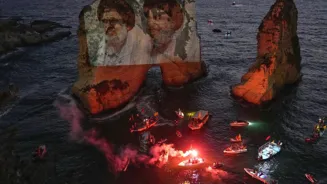On the evening of September 27, 2024, a string of Israeli bunker-busting bombs on a Hezbollah complex in Beirut's southern suburbs killed Hassan Nasrallah,
the then-chief of the Lebanese armed group Hezbollah. As his supporters marked one year since his killing, Israel revealed new details regarding his last days. The IDF (Israel Defence Forces) Intelligence Branch revealed that in the days leading up to the elimination of Nasrallah, he chose to remain in hiding in his Iranian-built bunker. In his last days, Nasrallah had tried to restore the organisation's capabilities and plan counterattacks. Each of such attempts were quickly thwarted, the IDF said. "The precise intelligence information that the Intelligence Branch had collected over the years allowed for a precise grasp of the location of his secret bunker, the construction of which was made possible through Iranian technology and strict compartmentalisation even within the most restricted circles of the terrorist organisation," said the IDF. Nasrallah was eliminated by Israel last year as part of 'Operation New Order' under which the military carried out strikes at Hezbollah's underground headquarters in Beirut. His heir apparent Hashem Safieddine was killed weeks later.
1 Year After Losing Nasrallah, Hezbollah Begins To Regroup
Hezbollah suffered a major blow with major leadership being eliminated by Israel. However, one year after Nasrallah's killing, the supporters has begun regrouping, according to a report by AP.
An Israeli military official, speaking anonymously in line with regulations to AP, said that the organisation is "attempting to rebuild its capabilities; efforts are limited but expected to expand."
Hezbollah Supporters Defy Order To Honour Slain Leaders
Thousands of Hezbollah supporters gathered in Beirut to honour Nasrallah and his successor Hashem Safieddine, both killed in Israeli airstrikes a year ago. They projected images of the group’s former longtime leader and his successor on the iconic arched Raouche rock to commemorate their deaths in Israeli airstrikes nearly a year ago, according to AP. The move came despite an apparent attempt by Lebanon’s Prime Minister Nawaf Salam to halt the planned light show.
Salam issued a circular earlier this week pointing to “the recent recurrence of the exploitation of national monuments for propaganda purposes and to hold activities in which partisan and political slogans are raised.”














